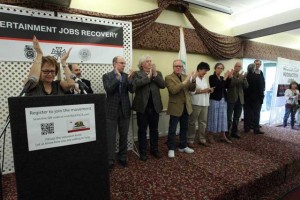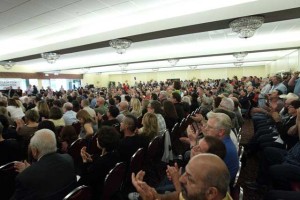
On Saturday, over 1,500 members of IATSE plus other California-based unions and guilds, including the local branch of the Teamsters, gathered at a Burbank rally with California state elected officials to support legislation to keep more film and television productions both shooting and posting in California. With the longtime tax incentives offered by Canada, but also more recently by other states including New York, Georgia and Louisiana, many productions have fled Southern California, leading to widespread job loss and familial disintegration.
The alliance, called the Entertainment Union Coalition, used the Feb. 22 gathering to officially launch a movement to recover many of the jobs which have been going to international locations for nearly 30 years, but have most specifically been going to other states within the U.S. for the past decade.
Entitled Assembly Bill 1839, with the combined support of IATSE and other organizations, plus the backing of several key state politicians, the initiative will require the endorsement of the California State Legislature and the Governor to become law. Laden with tax incentives that extend the current $100-million package, AB 1839 aims to stabilize what has been an erratic environment for California entertainment artists and technicians, and encourage erstwhile runaway productions to remain in state.
The impressive turnout at the rally, part of an overall movement – the Campaign to Recover California Entertainment Jobs – should not have surprised anyone who has actively worked in the industry of late, particularly for below-the-line craftspeople. At present, 10,000 local unions exist in California with 2,000,000 members.

Production accountant Sharon Craig who has been in Local 871 since 2000, said that it is naturally challenging for studios and production companies to resist going to other states, but they should remain in California, employing the people in California who work in the entertainment industry. “They could get as good a deal here if our legislators and our Governor would aggressively compete with the other states,” she said. “California was once the capital of filming. Now you have so many empty studios, people who have gone bankrupt, businesses that have gone bankrupt, and it shouldn’t be that way. Production accountants are that particular class of people of employees who travel more frequently than the others. [Productions] want to take people with them who have the experience, and it takes us away from home for long periods of time. I worked in Detroit at one point for 10 months straight. I hope that the state representatives and the legislators who are here listen and hear how it has affected so many people here who are out of work as a result of all of the money going to other tax credit states. Also, all of the money that they are missing out on: all of the tax dollars and revenue that the state of California is missing out on by not being competitive in the tax credit arena. I’m hoping that Governor Jerry Brown listens, and I’m optimistic because I think everybody is seeing the benefit to the other states, and they want California to have that same benefit if they can be as competitive.”
President of Local 706, the Makeup Artists and Hairstylists Guild, Sue Cabral-Ebert, who has been in IATSE for 37 years, saw the rally as an educational opportunity. “We’re here today to educate everyone to let them know what they can do to help in spreading the word throughout California,” she said. “This is a huge part of the economic base of California, and up until now, we haven’t had a lot of member participation. This is the start, and it’s exciting. We’re going to have about 16 legislators that will be signing on to support the bill. There are not a lot of parameters on the bill yet — that will be refined a little bit later — but we are going to be as close to being in competition with New York as we can. We need to get the support from Northern California, or people who are not familiar with the problem of runaway production. We want our jobs back. This is called the Jobs Recovery Act for a reason. There has been too much suffering.”
Tami Ransdell whose husband A.J. has been a propmaker in Local 44, working on major motion pictures for over 25 years, noted that A.J. has always had jobs in Los Angeles — until now. This year, he had to leave his family for Atlanta to work on The Hunger Games parts three and four, which are shooting simultaneously. “This summer, we are going to relocate to Atlanta because we don’t have a choice,” she said, noting that her 19-year marriage now involves her young daughter. “We are going to rent our house out and hope something gets done so that we can come back. We don’t want to leave. We are native Californians. It’s just horrible that we are having to make that decision. I don’t think people realize how much it affects our economy here. It seems like an exclusive group of people, but it affects so many small businesses. This is Hollywood. It’s crazy that we are even having to talk about that. It needs to stay here. I think we’ll bring some of it back if they make California competitive with some of these other states, but they are already building infrastructure in other states, and they are stealing our workforce. At some point, they are going to stop flying the L.A. guys out there. We are training our replacements. I think a good chunk of [production] is already gone, but we can bring a lot of it back if they would just help us out with the legislation. A lot of our friends that have been in the business just as long don’t have that opportunity to go out-of-state for work, so they are just leaving the business altogether, which is really sad. We’ve had friends who have lost their house. It’s bad — really bad.”
Local 700 supervising sound editor on feature films, Gregg Baxter, with 26 years in IATSE, currently works at Warner Bros. Studios and pointed to a subset of the problem – runaway postproduction. “We need these tax credits to stave off runaway postproduction because New York City has a postproduction tax credit of 30%,” he said. “In California, we only have a fund of $100 million, and only films $75 million and below qualify, so it’s exhausted quickly. As a result, there is a lot of production and postproduction happening in London and New York instead of California. I might have to move to New York. What’s happening now is that we had runaway production, but they would come back to Los Angeles to finish their movies. Now, there are major companies who will not finish films in Los Angeles because of the tax break in New York City. Everyone who works in Los Angeles in the unions is affected by this.”
Kathleen Felix-Hager is in Local 892, the Costume Designers Guild, with a dual membership in Local 706 for on-set costumers, and has 20 years in the industry, while her husband is a grip in Local 80 at Warner Bros. She is grateful for her regular flow of work but pointed to the reality of the disproportionate jobs which have left California. “Now it seems the jobs are all out of town,” she stated. “I just got offered three pilots, and they were all in other states. It makes it difficult. I’ve worked in five different states in the last five years – Louisiana, Georgia, North Carolina, Maryland and New York. There are so many skilled workers here. It’s the lifeblood of the city. We have the cream of the crop as far as the talent pool. I would love it to come back home. We are the working class, just trying to pay our bills and send our kids through college, and it makes it really, really hard. Your miss your family, you miss your dogs, you miss your home.”
One of the leaders and keynote speakers at the rally was Thomas Davis, the business representative of Local 80. “This is the best opportunity we’ve ever had,” he said of AB 1839’s chance to stem runaway production from California, “given what the facts have borne out, and with the number of productions which have left California, and the rise of the number of productions outside California, people are seeing what is really taking place here. It’s no longer what may happen; it’s what has happened.”
Davis, who has been in Local 80 since 1977, noted the number of productions which have sprung up in locations not typically considered production centers. Reflecting, he then additionally cited the recent and ostensibly long-term move of The Tonight Show from Burbank to New York. “Those are long-term jobs, people who depended on that job to stay in the middle class and to provide for their families and do what everyone hopes they can do every day – go to work, bring home a decent paycheck, and have decent benefits,” Davis said. “It has gotten to the point where those people who were skeptical in the past don’t express the skepticism they had in the past. When the bill was introduced last week, they immediately got 40 co-authors; then, within a couple of days, they had 60. It’s obviously gaining steam, gaining momentum, people like what they see. The program we have here in California is different than any other tax incentive program in California: it’s transparent; it’s accountable. It does what you would hope that any kind of tax program would do, and that is that is creates the jobs, because you can’t claim the credit until after you’ve created the job. The entertainment industry to this town really isn’t anything less than what the auto industry was to Detroit. And if we don’t take care of it, we saw what happened in Detroit.”





